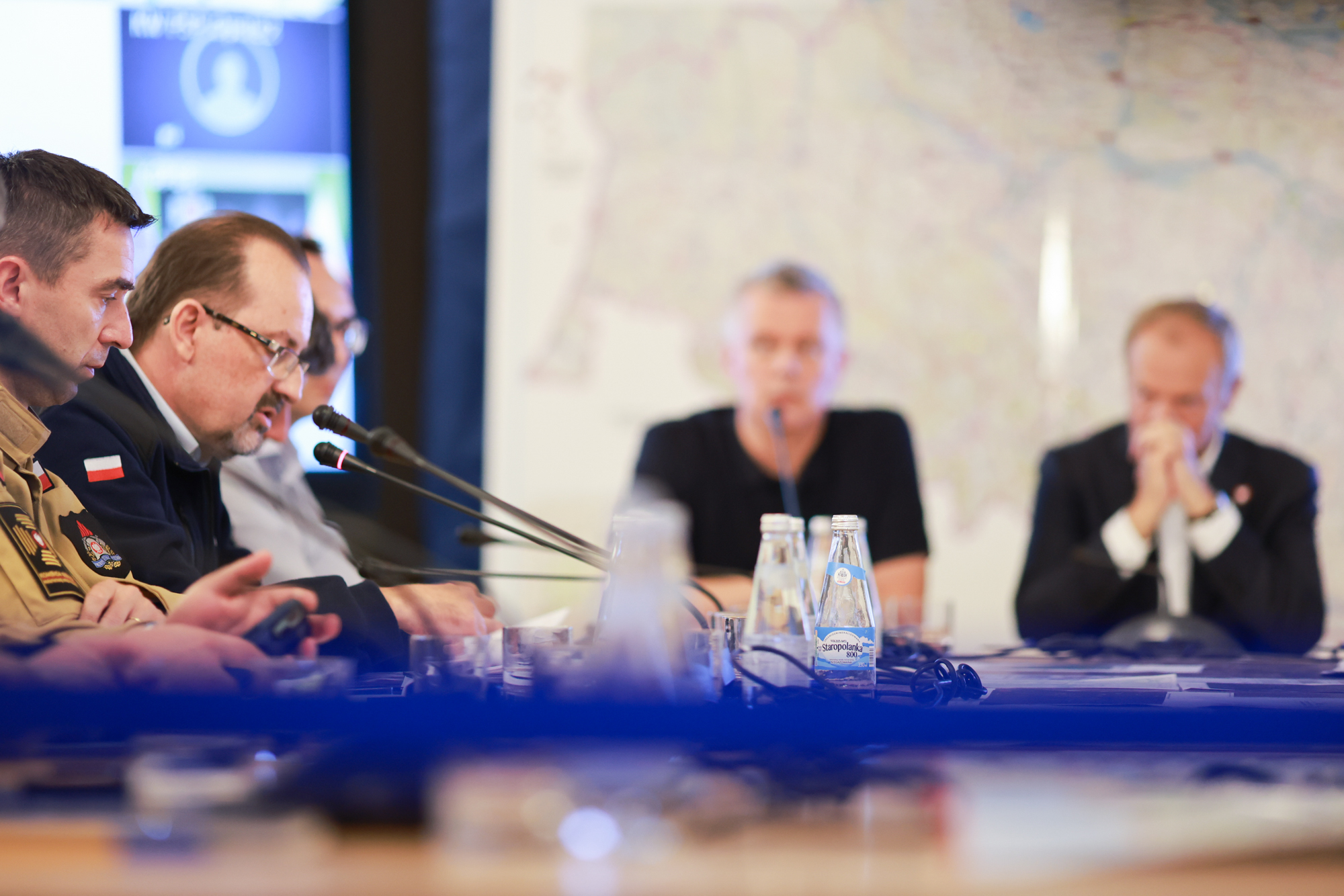Rebuilding+ - investing in joint safety
24.09.2024
Prime Minister Donald Tusk attended the emergency meeting in Wrocław, and announced investments in flood infrastructure as part of the Rebuilding+ scheme, which will help reduce the scale of any future disasters. The government will also bolster the Territorial Defence Forces, which proved very important in recent days.

Disaster response meeting in Wrocław
Prime Minister Donald Tusk returned to Lower Silesia after a meeting of the Council of Ministers to attend the crisis meeting in Wrocław. The Prime Minister asked the authorities to share the relevant information with the populace as transparently as possible.
“I appreciate the information from experts, but today we have the opportunity to explain the possible risks and threats to the people, who are going to face the flood surge in the cities and towns downstream,”
the Prime Minister said to the representatives of authorities.
He also thanked all the residents and authorities for their efforts focused on reinforcing the embankments and rebuilding the affected areas.
Rebuilding+ - gearing up for bold investments
The Rebuilding+ scheme brings new and better infrastructure that will help to safeguard the country against future natural disasters.
“Nature will not change - or rather it will change, but for the worse. We will not be able to prevent these disasters, but we have to be increasingly prepared to face them. And this area is where we have to carry out some serious work,”
the Prime Minister announced.
Among other things, the state and local authorities will have to quickly work out the necessary solutions for the future through public consultations These consultations will result in projects, which some might see as particularly annoying - such as building new reservoirs, but they are crucial from the standpoint of our collective safety.
“We know very well what the situation would be like without the Racibórz reservoir,”
the Prime Minister noted.
The government will take responsibility for the decisions concerning the required projects. The Prime Minister asked local government officials to facilitate dialogue with residents.
“We want you to participate in the conversation, we want you to help us convince your people. These projects are also in the interest of those who live there today, who run their businesses there, and who might suffer the same fate in a year, in five, or in seven years. We will have to work together to make optimal decisions,”
the Prime Minister explained.
The government will ensure funding for infrastructure projects.
“Wisdom and political responsibility dictate that we should always use the opportunities presented by crises and disasters in order to reshape the surrounding reality,”
Prime Minister Donald Tusk concluded.
Conversations with residents should be frank so that everyone understands why certain actions are necessary.
Territorial Defence Forces passed the test
In addition to the new laws helping the flood victims, the Council of Ministers adopted a bill supporting companies employing soldiers of the Territorial Defence Forces and Active Reserve.
“The state appreciates employers of soldiers of the Territorial Defence Forces, who keep them on their payroll as part of their corporate social responsibility,”
said Deputy Prime Minister and Minister of Defence Władysław Kosiniak-Kamysz.
He also outlined key measures introduced by this legislation, including tax breaks for companies employing these soldiers.
“We have to say it clearly - the Territorial Defence Forces have proven themselves in an emergency situation and passed the test,"
Donald Tusk concluded.
The state will aim to develop the TDF and bolster its effectiveness.
Plan for the coming days
Donald Tusk asked local government officials for information concerning their needs, not only with respect to the disaster response, but also in terms of clean-up efforts, such as waste disposal and collection.
“We will provide funding for the clean-up operation, including the removal of waste, damaged property disposal and all kinds of other refuse. If you need any other kind of help - people, organisations, technology - please provide specific information concerning your needs. We will do our best to help you - not only by funding these very demanding projects,”
the Prime Minister declared.
The water levels are dropping in many areas, but the authorities continue to keep a close eye on the embankments and other infrastructure. According to forecasts, at midnight, the water level in Wrocław will drop below the emergency level for the first time in many days.
“It is too early to declare that the flood threat in Wrocław is over. The embankments are still under pressure, but it is certainly a turning point - at least here in Lower Silesia,”
Donald Tusk stated.
The next meeting in the capital of Lower Silesia will take place on Tuesday at 8:00 a.m. Afterwards, the Prime Minister will return to Warsaw, where his cabinet will be briefing the Sejm on disaster relief. On Saturday, the Council of Ministers will once again focus on the state budget for the upcoming year.
“These changes concern the expenditure required for the recovery. We will also want to present the first summary of the losses, as well as the road to the recovery for many places, and the drafts we are working on,”
the Prime Minister announced.
In the following days, the Prime Minister might visit the Lubuskie and West Pomeranian Voivodeships, which are facing the flood threat now.




